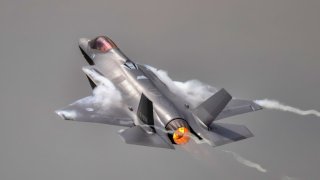PODCAST: Are We in a New Cold War? (w/ Dan Negrea)
As Washington confronts increasing belligerence from China, Russia, Iran, and North Korea, does the West face the start of a new “Cold War”? How should policymakers define victory? And what would a second Trump administration mean for the confrontation?
In this episode, Jacob Heilbrunn speaks with Dan Negrea, the Senior Director of the Freedom and Prosperity Center at the Atlantic Council and coauthor with Matthew Kroenig of the new book We Win, They Lose: Republican Foreign Policy and the New Cold War. From 2019 to 2021, Negrea was the State Department’s Special Representative for Commercial and Business Affairs. He previously served as a member of the Secretary of State’s Policy Planning office between 2018 and 2019, where he was responsible for the economic portfolio.
Editor’s Note: Below is an excerpt from Dan’s latest article in the National Interest, “Teaching A Man to Fish: Donald Trump’s Second-Term Alliance Policy.” You can read the full article here:
American voters trust the GOP more on most of their top priorities and Donald Trump is currently leading in most polls in the battleground states. Many European foreign policy observers find this alarming. Some think that, if he were to become president again, Trump would cede Ukraine to Russia, others that he would take the United States out of NATO, and still others that he would push the world into further chaos in the Middle East and Asia. But are these fears well-founded? After reviewing Trump’s policy track record, the answer is no.
For starters, the Trump administration left Biden a far more stable Middle East than the one he had inherited from Barack Obama. In 2018, Trump withdrew from the ill-conceived nuclear deal with Iran and inaugurated a “maximum pressure” policy on the Tehran regime. He also favored a normalized relationship between Israel and the Sunni countries, which led to the historic Abraham Accords of 2020. Critically, Trump established deterrence against Iran by killing General Qasem Soleimani, the Quds Force commander, to show the high cost of attacks on U.S. troops by Iranian proxies.
Alas, Biden unfortunately dismantled these successful policies. The current president removed the Iran-backed Houthis from the list of terrorist organizations and started indirect talks in order to relaunch the JCPOA. He also waived several sanctions on the Tehran regime, unfreezing billions of dollars that Iran could use to finance terror. This appeasement towards the ayatollahs has strengthened Iran’s regional terror network, thus endangering Israel and pushing the Saudis to seek better relations with Moscow and Beijing. Biden’s approach contributed to the current Middle East chaos, with U.S. ally Israel under attack on multiple fronts and Iranian proxies like the Houthis disrupting international shipping.
Secondly, contrary to the politically motivated and thoroughly debunked conspiracy theories about Putin’s supposed compromising materials on Trump, the previous administration was tougher on Russia than the Obama-Biden one and successfully deterred Moscow’s adventurism in the near abroad during its time in office. In 2019, it approved sanctions on the controversial Nord Stream 2 gas pipeline between Russia and Germany. Moreover, by withdrawing from the JCPOA, Trump angered Moscow, which had supported the deal. Also, in 2018, the then-Republican administration closed the Russian consulate in Seattle, expelling sixty Russian diplomats. In contrast, Biden waived sanctions against Nord Stream 2 in 2021—only to reimpose them one year later after Putin invaded Ukraine again. It is worth noting that Putin attacked Ukraine in 2014, under Obama, and in 2022, under Biden, but not during the Trump administration.
Image Credit: Shutterstock.


